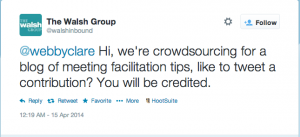This morning I received this tweet….
It got me thinking about what’s important in facilitating a meeting, so I’ve put together 6 of my favourite tips…
- Be organised. Send out any information/invites well in advance, show up to the venue ahead of time, and be prepared with any relevant documentation, materials or equipment that you need. If you don’t show respect for the other participants and the process you’ve committed to, why should you expect them to respect you?
- Take time to clarify – even if it feels like you’re stating/asking the obvious. Assumptions are always dangerous in meetings and can lead to much wasted time when you realise that participants had a totally different understanding of the topic under discussion. At the start of the meeting, clarify the purpose of the meeting and the structure and process you intend to follow. If there is anything said during the meeting that you don’t understand, or that you sense that others don’t understand, make a point to seek clarification there and then.
- Define success. Following from the above point, one of the most important questions to ask is something like ‘how will we know if this meeting is a success?’ and/or ‘if this meeting is successful, what will we have at the end of it?’. Think about your answer to the question before the meeting (it will help you to plan an agenda and process), but make sure to ask it of the participants too to ensure that you’re all on the same page. Revisit the question and the answers throughout the meeting to check your progress and to keep participants focused.
- Get ‘permission’ to facilitate. This may not be relevant or appropriate for all meetings, but it’s a tip that I learned from watching a former colleague of mine. At the start of meetings/workshops he’d ask the group to confirm their agreement to him taking on the role of facilitator and outline what he saw that role entailing. In my experience, I feel *much* more comfortable calling-out a participant who keeps interrupting, or redirecting a sidetracked conversation when the group has explicitly agreed up front for me to do this. If in the unlikely event the group decides that they don’t want you to facilitate, or to do certain things in your role as facilitator, then it’s much better to know before you find yourself halfway through a difficult or unproductive meeting!
- End with a summary of ‘actions’. At the conclusion of each meeting I find it’s always useful to confirm the actions or next steps. But rather than you trying to do this as a facilitator, ask each participant to summarise their actions. Also allow time to allow for clarification (see point 2) of action steps.
- Consider how space affects energy. My response to the above tweet was to suggest removing the chairs. Standing meetings often run more quickly and keep participants energised. Vic McWaters tweeted a suggestion to get rid of the tables. Traditional meetings in which participants are gathered around a large conference table seated in oversized conference chairs aren’t great for energy or engagement, so think about how you can reconfigure the space to shake things up at little! Walking meetings are also great for one-one-one conversations.

Leave a Reply